Innovation Management
The strategic goal of Innovation Management (IM) at the DKFZ is to transfer excellent research into first class applications to benefit patients and society. The IM team closely collaborates with our scientists, providing professional expertise and support in spin-off foundation, business development, market analysis, IP protection and technical contracts.

Team Innovation Management

As Chief Innovation Officer, Rainer Wessel leads the IM team to transform DKFZ's excellent research into innovations for patient benefit. Joining DKFZ in 2019, Rainer Wessel contributes more than 30 years of work experience, as CEO of biotech companies and in management positions in the life sciences and pharma industry, with a proven track record of fostering collaborations that bring impactful solutions to the market place.
Press release Appreciating the value of science
Led by Frieder Kern, the group drives innovation at DKFZ by empowering researchers to transform cutting-edge technologies into successful spin-offs. Through strategic guidance on equity, funding, and business development, we enable the creation of sustainable ventures that advance cancer care worldwide.
We support researchers throughout the company formation process, assisting with business plans, including market and competition analyses as well as patent evaluations. Our team also handles negotiations for shareholder agreements, equity participation, licenses, and cooperation contracts.
For established companies, we represent DKFZ in shareholder meetings, ensure compliance with reporting obligations, and manage participation activities. Additionally, we prepare board resolutions for capital increases, M&A transactions, and share sales, ensuring strategic growth and long-term impact.
Led by Karin Flieger and Alexandra Becker, this group is dedicated to safeguarding DKFZ's intellectual property through robust patent strategies and technical contracts. They secure the foundations of collaboration by ensuring confidentiality and compliance in material transfer and license agreements. This team provides essential support for navigating the legal landscape to protect innovations at every stage.
The „Asset Evaluation & Commercial Licensing Group (AECL)“ at the DKFZ Innovation Management supports driving the translation of scientific excellence into commercial and societal impact. The group led by Dirk Kuck specializes in the economic and strategic evaluation of assets e.g. inventions, technologies, and clinical studies — particularly those conducted within DKTK, NCT, Hector, and HITRON frameworks — assessing their market potential, applicability, and commercial strength. In addition, the group leads the drafting, negotiation, and management of IP-related industry agreements, including Material Transfer Agreements (MTA), Confidential Disclosure Agreements (CDA), license contracts, collaborative research agreements and contract research.
With a clear focus on Intellectual Property and its successful commercialization, the group supports DKFZ researchers to unlock the real-world potential of their assets. It provides targeted support for securing validation and translational funding through selected programs such as Go-Bio, VIP+, EXIST, relevant Helmholtz initiatives, and the Else Kröner-Fresenius-Stiftung. Activities centered on scientific or strategic research collaborations, operational project management, or spin-off creation are coordinated by other dedicated DKFZ units.
In the year 2025, the group comprised 3,74 FTE and has processed 250 contracts (e.g. 87 CDAs, 50 MTAs, 37 License agreements, 30 cooperation agreements), performed 40 asset evaluations of inventions and patent applications, assessed 53 grant applications and clinical study proposals.
Through its work, the group contributes to strengthening the DKFZ innovation pipeline, advancing the translation of research results, and fostering dynamic, value-driven partnerships with industry.
Led by Holger Hess-Stumpp the Business Development team links DKFZ with industry partners to drive collaboration and accelerate cancer research breakthroughs. By evaluating market potential and spotting commercialization opportunities, they connect scientific expertise with industry needs, positioning DKFZ as a trusted research partner.
Achievements at a glance
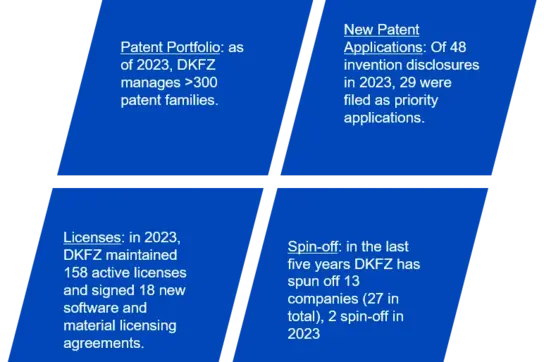
Since 1997, DKFZ has actively pursued technology transfer, making significant strides to bridge research innovations with practical applications. In 2019, the office was restructured and renamed Innovation Management, with a stronger focus on professionalizing patent and portfolio management, introducting business development and alliance management and bolstering startup activities.
Success Stories
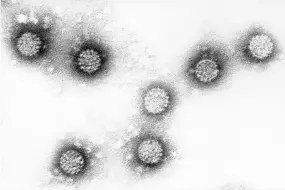
Vaccine against cervical cancer
Over 150 million vaccinations worldwide prove the safety and efficacy of the first vaccines ever developed to prevent cancer. They provide almost 100% protection against infection with the human papilloma viruses (HPV) 16 and 18; these are the viruses responsible for most cases of cervical cancer, one of the most common causes of cancer deaths in women. The development of the HPV vaccines grew out of the research work of Prof. Harald zur Hausen, for many years Scientific Chairman of the DKFZ, who was awarded the Nobel Prize in 2008 for his pioneering discovery that the viruses can cause cancer. Two vaccines are being sold: Gardasil® by Merck Inc. and Cervarix® by GSK.
Links:
https://www.krebsinformationsdienst.de/vorbeugung/risiken/hpv-impfung.php

High-precision radiosurgery of tumors
Teaming up with Accuray, a leading player in radiooncology and radiotherapy, DKFZ researchers have developed a beam-shaping device with continual image guidance in three dimensions known as an Iris Variable Aperture Collimator. The device permits precision radiosurgery of tumors, with treatment tailored to individual needs using the CyberKnife® system from Accuray. Accuray has concluded a license and cooperation agreement with the DKFZ in order to expand cooperation in the field of radiooncology.
Links:

Breaking the diffraction barrier
In 2014 Stefan Hell received the Nobel Prize in Chemistry for the development of nanoscopy – high-resolution light microscopy beyond the diffraction limit of light as defined by Abbe's Law. Patent-protected inventions by Hell and his team from the Laboratory for Optical Nanoscopy at the DKFZ were licensed out to Abberior Instruments, which is a spin-off of the Max Planck Society. They are used to manufacture microscopes that achieve hitherto unprecedented spatio-temporal resolution for the observation of dynamic processes in cells.
Links:
http://www.nobelprize.org/nobel_prizes/chemistry/laureates/2014/hell-lecture.html

Innate Cell Engagers improve the anti-tumor activity of immune cells
Affimed is a DKFZ spin-off company that specialises in the development of bispecific antibodies, known as Innate Cell Engager (ICE®), which lead innate immune cells to target and destroy cancer cells. Results from clinical trials indicate that Affimed’s ICE® molecules AFM13 and AFM24 exhibit well manageable safety profiles in CD30-positive lymphomas and EGFR-expressing solid tumors, respectively and show promising signs of therapeutic activity. Besides the development of monotherapies, combinations with NK cells or other immune-oncologic agents have shown promising results, partly with unprecedented efficacy rates.
Links:
https://www.affimed.com
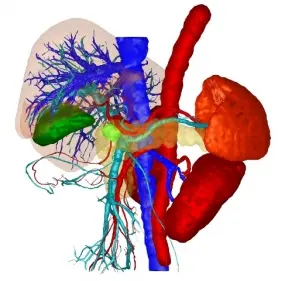
Software for improved diagnosis and therapy planning
Mint Medical GmbH, a spin-off from the DKFZ in 2010, has worked on developing radiology imaging in order to improve both the diagnosis and therapeutic strategies and procedures in cancer. Its methods for the automated analysis of image data increase the quality, diagnostic reliability, and efficiency of the entire radiological process from diagnosis to therapy planning, therapy, and therapy follow-up.
Links:
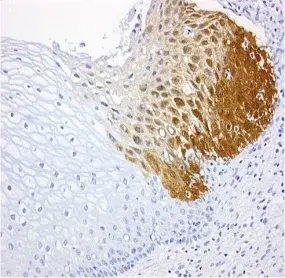
Early detection of cervical cancer
mtm laboratories AG, a Heidelberg company, spun off from the DKFZ in 1999. It developed in vitro diagnostics (IVD) for the early detection and diagnosis of cervical cancer that provide outstanding sensitivity and specificity compared with conventional tests. The technology is based on the immunocytochemical detection of the overexpression of the human p16 protein in cells undergoing HPV-mediated transformation, which may lead to cervical cancer. Having developed, produced, clinically validated, and marketed IVD tests for cervical histology and cytology worldwide on the basis of the p16 biomarker, mtm laboratories was sold to Roche for up to 190 million EUR (130 million upfront plus 60 million EUR milestone) in 2011.
Links:

Cell type diagnosis of metastases using antibodies to cytoskeletal proteins
Cell type-specific antibodies to intermediate filaments and to the desmosomal proteins of cell-cell adherens junctions developed at the DKFZ are now used worldwide; they are among the most frequently published antibodies in the entire biomedical and cell biological literature. It was cell biologist Werner Franke and his co-workers at the DKFZ that demonstrated that cell type-specific variants of components of the cytoskeleton retain their specificity in cancer cells too. They showed that by employing antibodies to these variants, it is possible to make a cell type diagnosis of cancer metastases, even if the original tumor is unknown. In order to make these antibodies for cancer diagnostics available for scientists worldwide, Franke and colleagues in Heidelberg founded PROGEN Biotechnik GmbH in 1983, one of Germany's first biotech companies.
Links:
http://www.dkfz.de/de/helmholtz-zellbiologie/Franke-in-Cancer_Research_DKFZ_2014_web.pdf
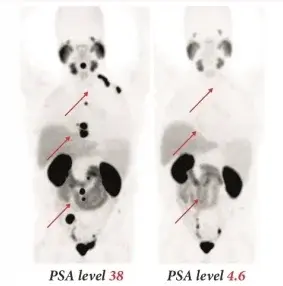
A radionuclide-coupled substance for the diagnosis and treatment of prostate cancer
Scientists at DKFZ developed PSMA-617, a compound that binds specifically to the prostate-specific membrane antigen (PSMA), which is highly overexpressed in prostate cancer cells. When the diagnostic agent PSMA-11 is labeled with the weakly radioactive radionuclide Gallium-68 (68Ga), it can be used in positron emission tomography (PET) to visualize even tiny clusters of prostate cancer cells. Conversely, when PSMA-617 is labeled with the strongly radioactive radionuclide Lutetium-177 (177Lu), it can specifically target and destroy cancer cells.
This innovative technology was initially licensed to the German biotech firm ABX advanced biochemical compounds GmbH and later to Endocyte Inc. in the USA. Novartis acquired Endocyte in October 2018. In 2022, Novartis received approval for PSMA-617 in both the USA and Europe and markets this novel therapeutic as Pluvicto.
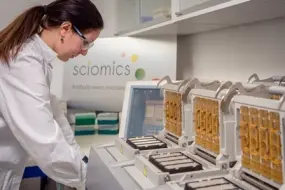
Antibody microarrays for screening of biomarkers in cancer
The biotech company Sciomics GmbH, a spin-off from the DKFZ in 2013, produces protein-based affinity microarrays for proteome analyses in research and clinical medicine. With the complex, high-density microarrays from cancer-relevant antibodies developed at the DKFZ, various biomarker signatures have been developed, filed for patenting, and published. The microarrays may be important for the diagnosis, prognosis, and prediction of cancer.
Links:

Competency cluster in imaging and radiotherapy: the alliance with Siemens Healthcare
Radiologists, radiooncologists and medical physicists from the DKFZ are cooperating with Siemens Healthineers, one of Germany’s leading medical technology companies. Within this collaboration, Siemens provides the latest technological advancement, development know-how, and technological infrastructure, while the scientists of DKFZ contribute their expertise in radiotherapy, medical physics and radiological imaging to develop new procedures in cancer diagnostics and treatment. The foundations for this cooperation, such as the 7 Tesla high field MRI scanner, housed in a dedicated building on the Neuenheimer Feld campus, are aiding the doctors of radiology, neuroradiology and radiation oncology at Heidelberg University Hospital and the Heidelberg Ion Beam Therapy Center.
Links:
https://www.siemens-healthineers.com/press/releases/pr-20190911034shs.html
https://www.siemens-healthineers.com/de/news/ionenstrahltherapie.html
https://www.dkfz.de/en/presse/pressemitteilungen/2017/dkfz-pm-17-35c-Double-imaging-of-prostate-cancer.php
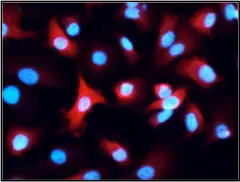
Detecting and combating cancers through cancer stem cell research
HI-STEM gGmbH is a non-profit public-private partnership between the German Cancer Research Center (DKFZ) in Heidelberg and the Dietmar Hopp Foundation. HI-STEM performs cutting-edge research to investigate the molecular principles of normal and malignant stem cells in healthy tissues, cancer and metastasis. HI-STEM develops novel diagnostic and treatment strategies to improve early cancer detection, precision oncology to target leukemic and solid tumor stem cells as well as regenerative therapies.
Cancer cells with stemness properties (leukemic or solid cancer stem cells) are responsible for therapy resistance and consequently drive relapse and metastases, which are the main cause of cancer related deaths. Cancer stem cells (CSCs) can stay dormant in their stem cell niche for long periods of time within the tumor which mediates their insensitivity to anti-proliferative treatment schemes such as chemotherapy. Upon re-activation however, these cells can cause rapid relapse even after a seemingly positive response to therapy.
Links:

ProtaGene Continues the Legacy of GeneWerk's Commitment to Safer Gene and Cell Therapies
GeneWerk was founded in 2014 as a spin-off of the German Cancer Research Center (DKFZ) and the National Center for Tumor Diseases (NCT) by Christof von Kalle and his colleagues, Manfred Schmidt and Annette Deichmann. The company's mission was to provide molecular-genetic and bioinformatic analyses supporting the development of safer and higher-quality gene and cell therapies throughout pre-clinical and clinical research processes.
GeneWerk acquired equity investment from Ampersand Capital Partners in 2020 to expedite its growth and establish a U.S. market presence. Then, in July 2021 GeneWerk, BioAnalytix, and Protagen Protein Services (PPS) merged to form ProtaGene.
Collaborations and Strategic Partnerships with Industry
Collaborations with industry are a key pillar of the DKFZ’s innovation strategy. Through research and development partnerships, the DKFZ fosters forward-thinking collaborations. This cooperation accelerates the translation of cutting-edge research into proprietary innovations and new therapies for the benefit of cancer patients.
Furthermore, by establishing long-term partnerships with leading companies in the industry, the DKFZ ensures that its innovation pipeline is aligned with market needs and that the translational impact of its research is maximized.
In addition to individual collaborations, the DKFZ has established several strategic alliances to further drive technology transfer.
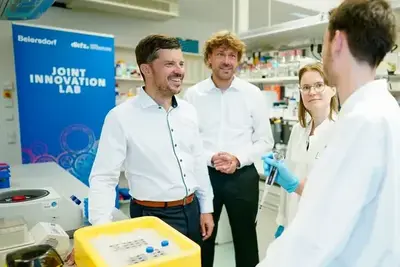
Given the strong link between aging and cancer, DKFZ and Beiersdorf have established a collaboration on skin cancer research. In 2023, we launched the first joint Innovation Lab, focusing on cancer prevention and anti-aging. The collaboration combines DKFZ’s expertise in cancer biology with Beiersdorf’s strengths in product development and commercialization. The lab, jointly funded for an initial three-year period, will generate insights that benefit both cancer prevention strategies and anti-aging solutions.
Press releases: Skin rejuvenation for cancer prevention: DKFZ and Beiersdorf establish Joint Innovation Lab

The beLAB2122 initiative is a multi-year partnership between DKFZ, the Universities of Heidelberg, Tübingen, and Frankfurt, EMBL, Evotec, and Bristol Myers Squibb (BMS). It aims to identify and develop novel therapeutic targets and technology platforms with the goal of launching new spin-out companies.
beLAB2122 provides funding, technology platforms, and mentoring to achieve preclinical proof of concept. Selected projects receive further support in building business cases, securing investment, and progressing towards commercialization.
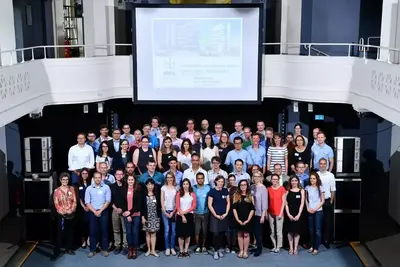
Since 2008, DKFZ and Bayer AG have collaborated to translate preclinical research into new therapies The alliance has initiated 67 projects selected from more than 160 proposals, leading to multiple drug development milestones. Four compounds have entered Phase 1 clinical trials, and Bayer AG licensed results from 10 projects with one still active as of today.
In 2013, the collaboration expanded with the creation of a joint immuno-oncology laboratory where DKFZ and Bayer researchers work side by side. This lab has contributed to three out of four Investigational New Drugs (INDs) developed under the alliance. In addition, the alliance has resulted in over 20 high-impact publications and 22 active patent families. The expertise gained in preclinical development will continue to benefit other collaborations and DKFZ’s spin-offs.
Example: BAY 2965501, developed by Bayer AG and DKFZ, is a selective, oral DGK-ζ (zeta) inhibitor that enhances T-cell activation by overcoming immune suppression. Preclinical studies show strong efficacy in tumor models with a favorable safety profile. A first-in-human phase I trial (NCT05614102) is enrolling patients with advanced solid tumors to evaluate safety, pharmacokinetics, and anti-tumor effects. BAY2965501 Clinical Trial
References:
Zuccotti, A., Carretero, R., & Hess-Stumpp, H. (2024). The alliance between the German Cancer Research Center and Bayer: A retrospective of an innovative collaboration model. In M. C. Michel & H. A. Wieland (Eds.), Public-private partnerships in drug research and development (pp. 83-95). Publisher.
Wellenreuther R., Keppler, D., Mumberg, D. Ziegelbauer, K. Lessl, M. (2012) Promoting drug discovery by collaborative innovation: a novel risk- and reward-sharing partnership between the German Cancer Research Center and Bayer HealthCare. Drug Discov Today. 2012 Nov;17(21-22):1242-8. https://doi.org/10.1016/j.drudis.2012.04.004
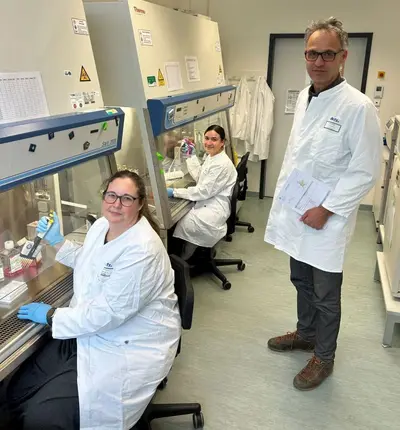
In 2023, DKFZ joined the Sanofi Innovation Awards Europe (Sanofi iAwards) program, which supports collaboration between academic institutions and industry. DKFZ researchers can apply for funding of up to €120,000 per project for early-stage, disease-relevant research. The program facilitates knowledge exchange with Sanofi’s R&D teams and aims to develop promising projects into sponsored research programs, licensing agreements, or start-ups. Two DKFZ proposals were selected in 2023 and 2024 through a peer review process.
Spin-off companies
2024
- Aipto TechBio GmbH - The aiPTO team has developed clinically validated predictive patient avatar models and trained generative AI models capable of predicting patient response to cancer treatment
- Merall Bioproducts GmbH - developed an advanced aquaculture system for crayfish meat production requiring minimum water, energy and feed. Combined with biorefinery for the automated processing of shell waste
- Serolomics GmbH - Services in the area of seroepidemiology
2023
- ITCC P4 gGmbH - PDX models for preclinical paediatric cancer research
- BiconY Therapeutics GmbH - Development of bispecific antibodies for the treatment of cancer
2022
- Health + Life Science Alliance Heidelberg Mannheim gGmbH - Research alliance with 7 research institutions
- Heidelberg Epignostix GmbH - Software (Methylation Classifier) for the diagnosis of brain tumours
- Tcelltech GmbH - Development of T cell therapeutics for cancer
- Paicon GmbH - Certification of diagnostic and therapeutic software
2021
- cAHRmeleon Bioscience GmbH - AHR Diagnostics
- European Plasmid Repository GmbH - Deposition and distribution of plasmids
2020
- Panosome GmbH - Trypanosome antibodies platform
- Medraxa Therapeutics GmbH - Development of apoptosis CD95 (APO-1/FAS) cancer therapeutics
- Cullinan Florentine Corporation - Development of bispecific FLT3xCD3 antibodies
- Hepione therapeutics Inc - Therapeutic Fentanyl antibody
2019
- Heidelberg Biolabs GmbH - Development/distribution of kits for bio labs (e.g. DNA purification)
2016
- Elthera AG - Development of a cancer therapeutic with L1 antibodies
- iOmx Therapeutics AG – Immunotherapeutics of the 2nd generation
2015
- Hector Institut für Translationale Hirnforschung gGmbH (HITBR) - Research into neurological disorders
- Heidelberg Immuno Therapeutix GmbH - Development of a therapeutic HSV antibody
- mbits imaging GmbH – Medical imaging for mobile devices such as tablet-PCs und smartphones
2014
- Heidelberg Biotech GmbH - Development of new generation of endostatin as cancer drugs
- ProtaGene GmbH - Biotechnological analytic/diagnostic for gene therapy; GeneWerk GmbH it´s now ProtaGene
2013
- Sciomics GmbH - Development of antibody microarrays
2012
- Aberior Instruments GmbH - Hardware for hiresolution microscops
- Multiplexion GmbH - Multiplex detection of biological analytes in cell culture systems used in biomedical research
2010
- Mint Medical GmbH - software for medical diagnosis, therapy planning and response; acquired March 2021 by Brainlab AG, München
- Peps4ls GmbH - Synthesis of peptides and peptide arrays for research
2008
- HI-Stem gGmbH - Stem cell research
2005
- Apogenix GmbH - Developing pharmaceuticals that modulate apoptosis
2003
- Chili GmbH – Software for Teleradiology and PACS; in May 2017, Chili GmbH became part of the NEXUS Group
2001
- PEPperPRINT GmbH - Peptide arrays and customized epitope mapping
2000
- Peptide Specialty Laboratories GmbH - Peptide production
1999
- Affimed AG - Human recombinant antibodies
- mtm laboratories AG - Detection, diagnosis and prevention of cancer (Link to F. Hoffmann-La Roche Ltd Media Release)
1995
- MRC Systems GmbH - Laser therapies
1983
- Progen Biotechnik GmbH - Diagnostics and research products; acquired by r-biopharm AG Darmstadt in 2012
Search Technologies

Explore innovative technologies and connect with unique licensing and partnership opportunities to drive your business forward. Powered by IN-PART.
German Cancer Research Center (DKFZ) available technologies | Powered by Inpart
Contact us
Tel.: +49 6221 42 2958
E-Mail: innovation(at)dkfz-heidelberg.de
LinkedIn: DKFZ Innovation Management
Visiting address
Mathematikon (2. Stock)
Berliner Straße 47
69120 Heidelberg
Please ring the doorbell at “DKFZ IM / CTO”

“Our mission is to effectively transform science into applications. My passion is to work in a well-structured and coordinated team, to bring entrepreneurial thinking into DKFZ and to get things done.”
Dr. Rainer Wessel, Chief Innovation Officer
General Terms and Conditions for the execution of research and development orders in the German Cancer Research Center Heidelberg,
Status: January 2019 Download